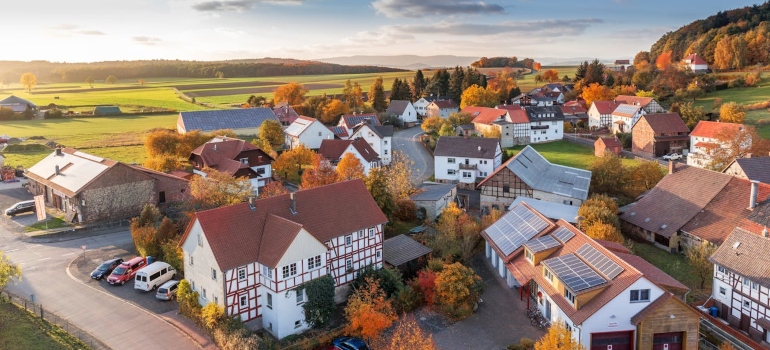Addiction stigma in West Virginia’s small towns affects not only those struggling with substance use disorders but also the families, friends, and communities around them. In these close-knit communities, judgment and misconceptions about addiction discourage people from seeking the help they need. In many cases, the silence surrounding addiction allows stigma to grow, leading to increased shame, isolation, and a lack of support for those who need it most. By addressing addiction stigma in West Virginia’s small towns, we can begin fostering an environment where people feel encouraged to seek treatment and embrace recovery without fear. In this blog, we’ll explore the roots of stigma, its impact on individuals and families, and practical ways to break down these barriers, paving the way for a more compassionate community.
About Addiction Stigma in Small Towns
Addiction stigma manifests differently in West Virginia’s small towns compared to larger cities. In these rural communities, people may not have access to as many resources or diverse perspectives, which can bring outdated beliefs about addiction. Moreover, the cultural focus on self-reliance and hard work often leads to the misconception that addiction results from a lack of personal responsibility. For instance, people in these communities may view addiction as something that only happens to “outsiders” or those without strong values, reinforcing judgmental attitudes.

Addressing this stigma is necessary to help people in these areas overcome shame and fear. When communities openly discuss addiction and view it as a health condition, they create an environment where recovery is not just possible but encouraged. Acknowledging the need for a change in perspective is the first step in dismantling the stigma that harms individuals and families alike.
The Roots of Addiction Stigma in Rural Areas
In small towns, addiction stigma is often rooted in cultural and societal norms. Close-knit communities can sometimes foster a lack of anonymity, where everyone seems to know each other’s business. This creates room for gossip, making people feel ashamed of seeking help. The perception of addiction as a moral failure rather than a health issue also fuels stigma.
Rural areas tend to have strong community bonds, and while this can be positive, it can also lead to judgment when someone’s actions appear to go against community values. Many people in these areas were raised with the belief that hard work and self-control are the measures of success, making it difficult for them to accept addiction as anything other than a personal choice. Because of this, the idea that addiction is a medical condition is often met with skepticism, and those struggling with addiction might feel isolated.
In these settings, the power of social connections in addiction recovery can be transformative. When community members support one another without judgment, they help break down the barriers of stigma, allowing for a healthier, more accepting environment. By shifting cultural perspectives, rural communities can encourage people to seek support, helping to reduce addiction rates and build a stronger community foundation.
Impact of Stigma on Individuals Seeking Help
For many individuals, the fear of being judged by their community prevents them from seeking treatment. Stigma can make people feel isolated, ashamed, and hopeless, intensifying their struggles with addiction. The emotional toll of addiction stigma is profound; it can lead to feelings of guilt and worthlessness, making recovery seem impossible. This stigma also prevents people from acknowledging the link between loneliness and addiction, which is a very important factor in recovery.

For example, someone in a small town might delay seeking help because they worry about becoming the subject of gossip or losing their job if their employer finds out. Others may avoid local resources entirely and instead turn to cities for treatment, where they feel less likely to be recognized. Unfortunately, this lack of immediate support can make recovery more challenging, prolonging the time they spend in active addiction. Recognizing these challenges is important in order to develop community programs that provide confidentiality and understanding to those who need help.
How Stigma Affects Families of Those Struggling with Addiction
Addiction affects entire families, and stigma adds another layer of burden. Families in small towns might experience shame or guilt by association, fearing they will be judged. This often makes it difficult for family members to openly support their loved one or even talk about their struggles. Additionally, parents or siblings may feel conflicted about encouraging someone to seek help if they worry it will draw negative attention to the family.
Through the benefits of individual and group therapy, families can find support and learn coping strategies, allowing them to better understand and support their loved ones on the path to recovery. Group sessions can provide a sense of solidarity, as families see they are not alone and meet others who share similar experiences. This reduces isolation and helps them find ways to advocate for their loved ones despite community pressures. Encouraging families to become involved in local advocacy or support groups can empower them to speak out against stigma and promote empathy within their communities.
Barriers Created by Stigma in Accessing Treatment
In some small towns, there may also be limited treatment options, making it necessary to travel to nearby cities. This lack of anonymity can further discourage individuals from seeking treatment.

Others may consider options like rehab Cambridge OH, which provides a more discreet way to access services that aren’t available locally. However, transportation and affordability are often additional concerns. By reducing stigma, communities can help make addiction treatment more accessible and acceptable, encouraging individuals to view recovery as a positive, empowering step.
Community Education and Awareness as a Solution
One of the most effective ways to address addiction stigma is through community education and awareness. Dispelling myths and misconceptions about addiction can help people view it as a health condition rather than a moral failing. Community-based efforts, such as workshops or public talks, can shift perspectives and reduce judgment. Schools, local organizations, and healthcare providers can collaborate to educate the public on the realities of addiction and recovery. Successful education initiatives in similar communities have included:
- School programs: Teaching students about addiction and mental health as part of the curriculum.
- Community panels: Hosting events where people in recovery, mental health professionals, and family members share their stories.
- Public service announcements: Using local media to share messages about addiction, recovery, and available resources.
The Role of Local Leaders in Reducing Stigma
Local leaders, healthcare providers, and other influential figures have a powerful influence in shaping community attitudes. By speaking openly about addiction and showing compassion for those affected, local leaders can help reduce stigma. In West Virginia, there are already examples of local initiatives led by people who understand the challenges associated with addiction and are actively working to create a more supportive environment. For instance, leaders can collaborate with nearby treatment centers, such as rehab Point Pleasant WV, to provide education and resources. Through these efforts, they can encourage a cultural shift that embraces recovery and supports individuals on their journey.

Sharing Personal Stories: Humanizing the Face of Addiction
Personal stories have a unique power to break down stigma and create empathy. When people share their experiences with addiction and recovery, they humanize the issue, helping others see beyond stereotypes. Personal stories foster understanding and reduce judgment, allowing community members to view addiction from a more compassionate perspective. Community events, social media platforms, or local support groups can provide safe spaces for people to share their stories.
Building a Supportive Environment in Small Towns
Creating a supportive environment in small towns is necessary for individuals in recovery. Here are a few ways to do that:
- Create safe spaces: Establish local support groups or meet-ups where people can discuss their struggles without fear of judgment.
- Promote positive messaging: Use community bulletin boards, social media, and local publications to spread messages of hope and recovery.
- Encourage open conversations: Host events where people can discuss addiction openly, helping to reduce stigma and build community understanding.
Changing Language to Combat Stigma
Language plays an important role in shaping perceptions of addiction. Words like “addict” carry negative connotations, while terms such as “person in recovery” emphasize the individual’s journey. By using non-stigmatizing language, communities can help shift attitudes toward addiction. Words matter, and choosing language that respects and supports people in recovery is a simple yet powerful way to reduce stigma. Educating the public on the importance of respectful language can also encourage others to make conscious choices when discussing addiction, promoting a culture of empathy and understanding.

Overcoming Fear of Judgment in Tight-Knit Communities
Living in a small town can make it difficult for people to seek help due to the fear of judgment. People worry about becoming the subject of gossip or being shamed for their struggles. This leads to isolation and depression, which can all potentially lead to suicide too. Since 2010, suicide has claimed more than 500,000 lives nationwide, raising significant concerns about public health. In the United States, the number of suicide deaths reached a peak in 2018 (48,344), then declined slightly in 2019 and 2020 before rising once again in 2021 (48,183 deaths). The fastest-growing demographics for suicide deaths are younger people, people of color, and residents of rural areas.To overcome this fear, people from small towns can use a few practical strategies:
- Focus on self-compassion: Remember that seeking help at rehab Athens OH is a sign of strength, not weakness.
- Find allies: Seek support from trusted friends or family members who understand your situation.
- Set boundaries: Politely but firmly address any negative comments or attitudes you encounter, and don’t hesitate to distance yourself from harmful influences.
By taking these steps, individuals can better manage the fear of judgment and prioritize their recovery.
Supportive Resources Available in West Virginia’s Small Towns
West Virginia has numerous resources available for those seeking addiction treatment. Here are a few options:
- Harmony Ridge Recovery Center: Provides a range of services for individuals at various stages of recovery.
- Local Rehab Facilities: Nearby cities offer treatment options, including rehab Marietta OH, which provides specialized programs.
- Support Groups: Organizations like Alcoholics Anonymous and Narcotics Anonymous host regular meetings in West Virginia.
- Educational Programs: Some local organizations offer community workshops on addiction and mental health awareness.
The Importance of Mental Health Support in Tackling Stigma
Mental health plays an important role in addiction recovery. Addressing mental health issues alongside addiction helps reduce stigma and provides individuals with a more comprehensive support system. Mental health professionals offer guidance, helping people cope with underlying issues that contribute to addiction. Through therapy and counseling, individuals can build coping mechanisms, manage stress, and improve their overall well-being. Emphasizing the importance of mental health support in tackling addiction stigma also encourages a more holistic approach to recovery, one that recognizes and respects each person’s unique challenges.

The Role of Social Media in Changing Perceptions
Social media is a powerful tool for raising awareness and challenging negative stereotypes about addiction. Online campaigns can reach a wide audience, spreading messages of support and understanding. Communities can use social media to share stories, promote local resources, and encourage conversations about addiction and recovery. By using these platforms to share positive stories and educate the public, small towns in West Virginia can begin shifting perceptions and building a more supportive environment for those affected by addiction.
Building a Future Free of Addiction Stigma in West Virginia’s Small Towns
Addiction stigma in West Virginia’s small towns creates significant challenges for people struggling with substance use disorders. It prevents people from seeking help, isolates families, and reinforces harmful stereotypes. By addressing addiction stigma, communities can create an environment that supports individuals in recovery, encourages families, and promotes understanding. With education, awareness, and open conversations, small towns can transform the way they view addiction, fostering a culture of empathy and compassion. Let’s work together to break the silence, reduce stigma, and build a West Virginia where recovery is celebrated and supported.
Reference:



